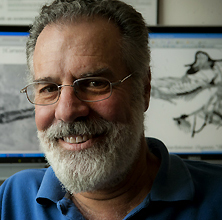
John Caruso ’69 (photo by Paula Burch-Celentano)
Fish biologists have named a newly identified genus of fossil anglerfishes after John H. Caruso ’69, professor of practice, ecology, and evolutionary biology, Tulane University, New Orleans, La.
Caruso, a biology graduate and assistant professor of biology at Lafayette from 1977-83, is an ichthyologist (a zoologist who studies fishes) and one of only two biologists in the world who have focused their research on anglerfishes. The other, Theodore Pietsch of the University of Washington, and his co-author Giorgio Carnevale of the University of Toronto, gave Caruso’s name to the genus in the March 2012 Journal of Systematic Palaeontology.
Caruso has been interested in the systematics of chaunacid and lophiid anglerfishes since the early 1970s. “I became interested in the lophiids [monkfishes] first because they were very poorly known and greatly in need of a revisionary study,” he says.
Besides the new genus, Caruso has discovered and described seven new species of anglerfishes and a new species of giant snake eel.
“My most exciting discovery was a new species of deep-water lophiid anglerfish in the genus Sladenia,” he says. “It was described in 1976 from the first specimens seen in nearly 70 years. At the time the entire genus was known from only two specimens from the Indian Ocean and Indo-West Pacific, each having been described as a distinct species. I am still working on that genus.”
Caruso got research experience in parasitology with Bernard Fried, now Kreider Professor Emeritus of Biology.
“He was a great teacher and an inspiring mentor, so even though I didn’t want to pursue a career in parasitology, I found it fascinating, and I loved working with Bernie,” he says.
“Having a genus named in your honor is a tremendous accomplishment,” says Fried, with whom Caruso co-authored his first scientific article.
Fried is one of the world’s foremost experts in the field of parasitology. Fellow scientists have named three organisms in his honor, including Echinostoma friedi in 2000.
The Caruso anglerfishes were discovered in fossils at Monte Bolca in the Italian Alps, a site with limestone formations dating from the Eocene, 56-34 million years ago.
